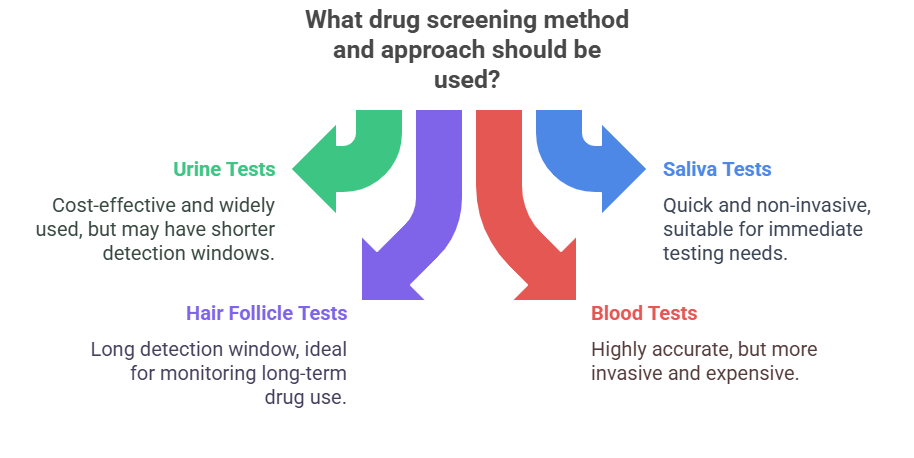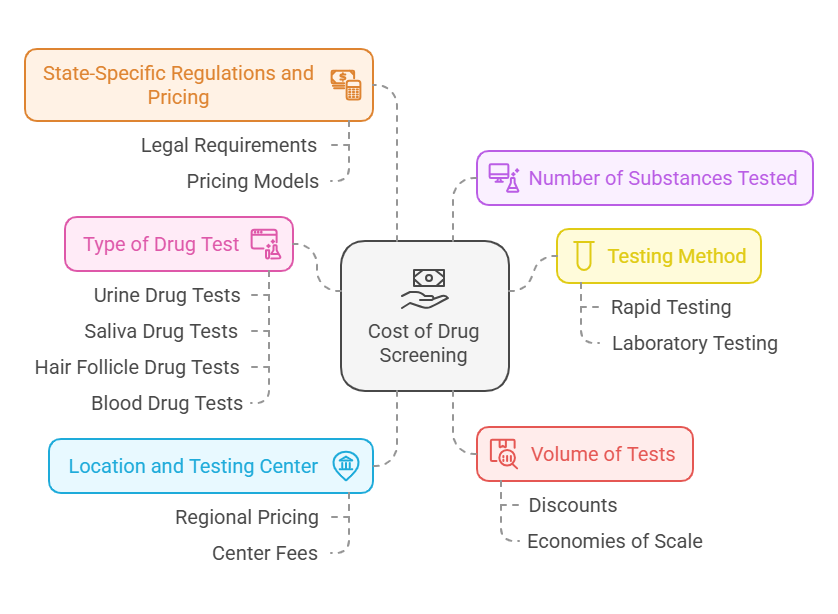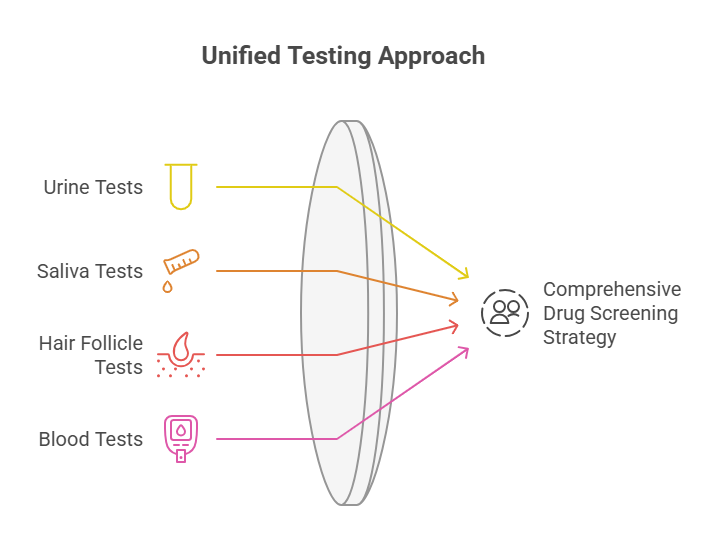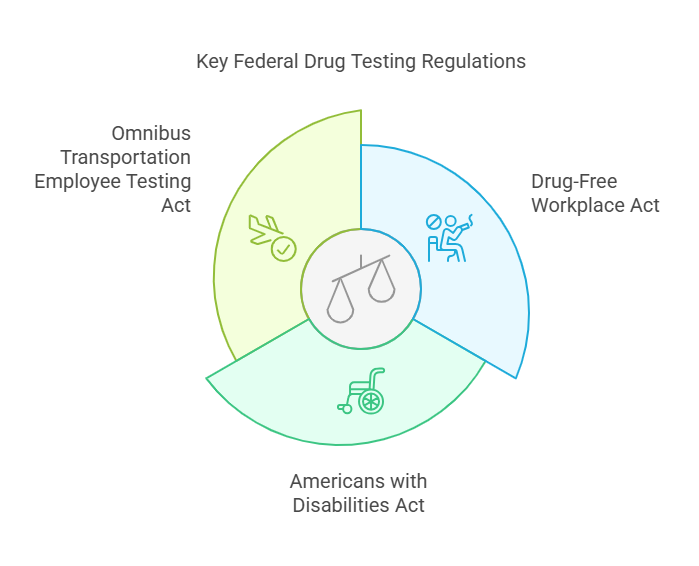Evaluating the True Cost of Drug Testing Programs

Understanding the Cost of Drug Screening: Factors and Pricing Explained
Drug screening has become an essential part of various industries and sectors, including employment, healthcare, and legal frameworks. It helps ensure that employees and individuals are free from the influence of drugs, which can significantly impact safety, performance, and well-being. As businesses, government agencies, and individuals seek drug screening services, one crucial question arises: What is the cost of drug screening?
We will introduce the concept of drug screening, explain its importance in various contexts, and explore the key factors that influence the cost of drug screening. By understanding these factors, you will be able to make informed decisions about selecting the right drug screening services based on your needs.

Introduction to Drug Screening
Drug screening involves testing individuals for the presence of illicit drugs or controlled substances. This process is often employed by employers, legal authorities, healthcare providers, and organizations for various reasons such as pre-employment screenings, random testing, drug abuse monitoring, post-accident testing, and legal compliance.
There are several testing methods available, including urine tests, saliva tests, hair follicle tests, and blood tests. Each method offers distinct advantages and drawbacks in terms of cost, accuracy, detection windows, and ease of administration.
While drug testing is widely used, one of the most common concerns among employers and individuals is the cost of these tests. The cost of drug screening can vary greatly depending on various factors, including the type of test used, the number of substances being tested, the location of the testing service, and whether the test is being administered in a one-time or large-scale scenario.
Why Drug Screening Matters
Drug screening serves a critical purpose in a wide range of settings:
- Employment: Many employers require drug screening as part of their hiring process to ensure that potential employees are free from illicit drug use, ensuring workplace safety and reducing the risk of accidents.
- Healthcare: Drug screening is essential in healthcare settings, especially for patients undergoing treatment for substance abuse, as part of monitoring their recovery.
- Legal Compliance: Drug screening may be required for legal reasons, such as compliance with regulations in industries like transportation, construction, and healthcare, where safety is paramount.
- Sports: Drug screening is common in competitive sports to prevent cheating and ensure fairness.
Given the importance of drug testing, the cost becomes an important consideration, particularly for employers who need to manage expenses while ensuring a safe and productive work environment.
Factors Affecting the Cost of Drug Screening
The cost of drug screening can vary significantly depending on multiple factors. These factors influence not only the price of the test but also the type of testing required and the service provider’s pricing model. The following are the key factors that influence drug screening costs:

1. Type of Drug Test
The type of test used is one of the most significant factors affecting the cost of drug screening. Different drug tests have varying levels of complexity, which directly impacts the overall cost. The four primary types of drug tests are:
Urine Drug Tests
Urine drug testing is one of the most widely used and cost-effective methods. It detects the presence of drugs or their metabolites in the urine. The test is commonly used for pre-employment screenings, random drug testing, and post-accident tests. Urine tests are also a preferred choice for their convenience and relatively lower cost.
- Cost Range: $30 to $60 per test
Saliva Drug Tests
Saliva testing is another non-invasive drug test that detects drugs within a short period after consumption (typically within the last 24 to 48 hours). Saliva tests are often used for on-site testing or random testing because they are quick and easy to administer, providing immediate results.
- Cost Range: $35 to $70 per test
Hair Follicle Drug Tests
Hair follicle drug tests are more expensive but are considered one of the most accurate methods for detecting long-term drug use. They can detect drug use from several weeks to several months before the test. As a result, hair follicle testing is commonly used for court-ordered drug screenings and long-term monitoring.
- Cost Range: $100 to $150 per test
Blood Drug Tests
Blood testing is the most invasive and expensive method. It is used to detect the presence of drugs in the bloodstream in real-time, making it suitable for detecting recent drug use. However, it is typically reserved for more specific scenarios, such as post-accident drug testing or criminal investigations.
- Cost Range: $150 to $300 per test
Each of these drug testing methods comes with its own price range and can be selected based on the intended purpose of the screening. In general, urine tests are the most affordable and commonly used, while blood and hair follicle tests are more costly due to their increased accuracy and longer detection windows.
2. Number of Substances Tested
The number of substances tested also plays a critical role in determining the overall cost of the drug screening process. Drug tests are designed to check for various substances, and the more substances that need to be tested, the higher the price.
For example, a standard 5-panel drug test (which tests for substances like marijuana, cocaine, opiates, amphetamines, and PCP) is generally less expensive than a 10-panel drug test, which tests for a broader range of substances, including benzodiazepines, barbiturates, and synthetic drugs.
- 5-Panel Test: $30 to $60
- 10-Panel Test: $50 to $100
The price of a drug screening can increase depending on the number of substances included in the panel. For businesses and organizations that require a broader range of substances to be tested (for example, to meet regulatory requirements), they may have to pay a higher price for testing.
3. Testing Method: Rapid vs. Laboratory Testing
Drug tests can either be rapid tests or laboratory-based tests. Rapid tests are designed to provide immediate results, often within minutes. Laboratory tests, on the other hand, require more time to process the samples and provide more accurate results.
- Rapid Tests: These tests are typically more affordable and suitable for quick screenings, such as on-site testing in the workplace or random drug testing. They usually cost less but may be less accurate than laboratory-based tests.
- Laboratory Tests: These tests are more expensive, as they involve sending samples to a certified laboratory for analysis. However, laboratory tests are highly accurate and can detect a wider variety of drugs or controlled substances.
The decision between rapid tests and laboratory tests depends on factors like the level of accuracy required and the purpose of the test (e.g., pre-employment screening vs. random testing).
4. Location and Testing Center
The location of the drug screening center can also impact the overall cost. Drug tests conducted in larger cities or urban areas tend to be more expensive than those in rural areas due to the higher operational costs in urban locations. Additionally, on-site testing (where the employer arranges for a testing service to come to their premises) may add travel fees, resulting in a higher cost.
5. Volume of Tests
The volume of drug tests required can also influence the pricing structure. When employers or organizations need to conduct screenings for multiple individuals (such as pre-employment testing for large batches of new hires), they may be eligible for bulk pricing or volume discounts.
The cost per test often decreases when the number of screenings increases. Organizations with a high turnover rate or those that need random drug testing for a large number of employees may find that negotiating a bulk contract with a testing provider leads to cost savings.
6. State-Specific Regulations and Pricing
Finally, state-specific regulations can also influence the cost of drug screening. Certain industries, such as transportation and construction, may require more extensive drug testing due to safety concerns. Additionally, some states have stricter laws regarding drug testing policies, which could require additional administrative processes or more comprehensive testing, thus increasing the price.
For example, California has strict regulations on the types of drugs that can be tested, while other states may mandate drug tests for specific positions or industries. Employers must ensure that they comply with state laws when selecting drug screening services, which can influence the cost of testing.
Types of Drug Screenings
Drug screenings can be performed using different methods, with each having its own unique characteristics, advantages, and cost considerations. The four primary types of drug screening methods are urine tests, saliva tests, hair follicle tests, and blood tests. Let’s explore each of these methods in detail, including the typical costs and the benefits of using one over the other.

1. Urine Drug Tests
Overview
Urine drug testing is the most common and widely used method of drug screening. It is often used for pre-employment screenings, random testing, post-accident testing, and periodic monitoring. Urine drug tests are preferred due to their cost-effectiveness, ease of use, and reliable results. The test is conducted by analyzing a urine sample for the presence of specific drugs or their metabolites.
Cost
The cost of a urine drug test generally ranges from $30 to $60, depending on the number of substances tested and the testing provider. Additional costs may be incurred if the sample needs to be sent to a laboratory for confirmation or if a more advanced panel (such as a 10-panel test) is required.
Pros and Cons
Pros:
- Cost-effective: Urine tests are inexpensive compared to other methods like hair follicle or blood tests.
- Widely available: They are easy to administer and are available at most testing centers.
- Accurate: Urine tests are generally reliable for detecting drug use within the past few days to a week.
Cons:
- Short detection window: Urine tests typically detect drugs within 72 hours to a week, which may not be ideal for detecting long-term drug use.
- Potential for adulteration: Urine samples can be tampered with, and testing for adulterants is often necessary to ensure sample integrity.
2. Saliva Drug Tests
Overview
Saliva drug tests are becoming increasingly popular due to their non-invasive nature and the ability to provide quick results. This type of drug test involves collecting a sample of saliva, typically from the mouth, and testing it for the presence of drugs or their metabolites. Saliva tests are commonly used for random testing, on-site testing, or post-incident testing.
Cost
Saliva tests typically cost between $35 and $70. These tests are often priced slightly higher than urine tests due to the additional convenience and ease of use.
Pros and Cons
Pros:
- Non-invasive: Saliva tests are easy to administer, making them more convenient than other testing methods.
- Quick results: The test can be completed on-site and results can often be provided within minutes.
- Short detection window: Ideal for detecting recent drug use (within the past 24-48 hours).
Cons:
- Limited detection window: Saliva tests cannot detect drugs used beyond a few days, which may not be suitable for employers or organizations needing to monitor long-term drug use.
- Accuracy issues: Saliva tests can sometimes yield false positives or false negatives depending on factors like the sensitivity of the test or individual biological factors.
3. Hair Follicle Drug Tests
Overview
Hair follicle drug testing is a highly accurate method for detecting long-term drug use. It works by analyzing a hair sample (typically 1.5 inches from the scalp) for the presence of drugs and their metabolites. The test can detect drug use dating back up to 90 days, making it an excellent option for identifying individuals with a history of drug use. It is frequently used in situations where long-term drug abuse needs to be detected, such as for legal cases or court-ordered screenings.
Cost
Hair follicle drug tests are significantly more expensive than urine or saliva tests. On average, a hair follicle test costs between $100 and $150 per test. However, this price can vary based on factors such as the testing provider and the specific panel used.
Pros and Cons
Pros:
- Long detection window: Hair follicle tests can detect drug use for up to 90 days, which is advantageous for monitoring long-term drug use.
- Highly accurate: Hair follicle tests are considered one of the most accurate drug tests, with a very low likelihood of false positives.
- Difficult to adulterate: Hair samples are difficult to tamper with, making this method highly reliable.
Cons:
- Expensive: Hair follicle tests are one of the most expensive drug tests available.
- Longer turnaround time: Results from hair follicle tests may take longer to process than urine or saliva tests, sometimes requiring several days for results.
- Limited for recent use: Hair tests may not be suitable for detecting drug use within a short period (less than 7 days), making them less effective for immediate post-incident testing.
4. Blood Drug Tests
Overview
Blood drug tests are typically used when the most accurate and reliable results are required. Blood tests can detect the current presence of drugs in the bloodstream, and they are commonly used in situations where immediate results are necessary, such as after a workplace accident or for criminal investigations. This method is more invasive than the others, as it requires a healthcare professional to draw blood.
Cost
Blood drug tests are among the most expensive drug tests, with prices ranging from $150 to $300 per test. The higher cost is due to the specialized equipment and lab processing required for blood analysis.
Pros and Cons
Pros:
- Most accurate: Blood tests are considered the most accurate for detecting recent drug use (within the last few hours or days).
- Real-time detection: Blood tests show the actual concentration of drugs in the bloodstream, making them suitable for immediate or urgent testing scenarios.
Cons:
- Expensive: Blood tests are significantly more costly than urine, saliva, or hair follicle tests.
- Invasive: Blood testing is more invasive than other methods and requires a healthcare professional to draw blood, which can be uncomfortable for the individual.
- Limited detection window: Although blood tests can detect drugs in real-time, they do not provide long-term history of drug use like hair follicle tests.
Cost Breakdown by Test Type
| Test Type | Cost Range | Detection Window | Accuracy | Common Uses |
|---|---|---|---|---|
| Urine Test | $30 to $60 | 72 hours to 1 week | High | Pre-employment, random testing, post-accident |
| Saliva Test | $35 to $70 | 24 to 48 hours | Moderate | On-site testing, random testing |
| Hair Follicle Test | $100 to $150 | Up to 90 days | Very High | Long-term drug use monitoring, court-ordered tests |
| Blood Test | $150 to $300 | Hours to days | Very High | Post-accident testing, criminal investigations |
Choosing the Right Test for Your Needs
Selecting the right drug screening method depends on several factors, including cost, accuracy, detection window, and purpose. Below are some tips to help you choose the right test:
1. Pre-Employment Drug Screening
For pre-employment drug testing, employers typically look for a cost-effective, quick, and reliable method. Urine tests are the most commonly used, as they are affordable and widely available. However, saliva tests may also be an option if quick on-site testing is preferred.
2. Random or Periodic Testing
For random drug testing or periodic monitoring, employers may opt for urine tests or saliva tests due to their convenience and lower cost. Hair follicle tests can be considered for situations where long-term drug use history is a concern, but they may be more expensive.
3. Post-Incident or Safety-Critical Roles
In safety-sensitive industries, such as transportation, construction, and healthcare, blood tests or urine tests may be used after accidents or incidents, as they can provide immediate and reliable results.
4. Legal or Court-Ordered Testing
For court-ordered drug testing or long-term monitoring of drug use, hair follicle tests are often the best choice due to their long detection window. Blood tests can also be used for specific legal requirements where accurate real-time drug detection is essential.
Legal Aspects of Drug Screening
While drug screening is a powerful tool for maintaining a safe and compliant workplace or environment, it comes with a set of legal considerations that must be followed. Employers and individuals must be aware of the federal and state regulations, privacy concerns, and consent requirements to ensure the screening process is both lawful and ethical.
1. Employee Rights and Consent for Testing
One of the fundamental legal principles of drug screening is that employee consent is typically required before a drug test is administered. Employers must obtain written consent from the employee before conducting a test. Consent forms should clearly explain the testing procedure, substances being tested, and the potential consequences of failing the test.
Failure to obtain consent can lead to legal challenges, including claims of violations of privacy or unlawful testing. Moreover, employees have the right to refuse drug testing, though this may result in disciplinary action or termination, depending on the employer’s drug testing policy.
2. Federal and State Regulations Governing Drug Testing
Drug testing in the workplace is governed by various federal and state-specific regulations. Some of the key federal regulations include:

- The Drug-Free Workplace Act: Federal contractors and employers receiving federal grants must maintain a drug-free workplace and conduct drug testing in compliance with this law.
- The Americans with Disabilities Act (ADA): Employers must ensure that drug testing does not discriminate against individuals with disabilities, particularly those who are in recovery for drug addiction.
- The Omnibus Transportation Employee Testing Act: Employees in safety-sensitive positions within transportation (e.g., truck drivers, pilots) are subject to federal drug testing requirements.
In addition to federal laws, each state has its own set of laws that can impact drug testing procedures. For example, California has stricter privacy laws, while other states like Texas and Florida allow employers to test employees with fewer restrictions.
3. Privacy Laws and How Results Are Handled
Privacy is a crucial concern when conducting drug screenings, especially since the results can reveal sensitive information about an employee’s health and behavior. Employers must follow confidentiality laws to protect the privacy of individuals being tested. Drug test results should be stored securely and only shared with authorized personnel.
Some specific legal requirements regarding privacy include:
- Confidentiality: Test results should only be disclosed to individuals who have a legitimate need to know (e.g., the employee, the employer’s designated personnel, or medical review officers).
- Retention of records: Employers must keep records of drug tests for a specified period, depending on state laws and company policy.
- Use of results: Employers should only use drug test results for the intended purpose, such as employment eligibility or compliance with regulations, and should not use them for discriminatory purposes.
4. Industry-Specific Regulations
Certain industries and roles are subject to more stringent drug testing requirements due to safety concerns, such as in transportation, healthcare, and construction. For instance:
- Transportation: Employees in transportation (e.g., truck drivers, train operators) must comply with the Department of Transportation (DOT) drug testing regulations, which mandate random testing, post-accident testing, and pre-employment screenings.
- Healthcare: Employees working in healthcare may undergo drug testing to comply with regulations ensuring patient safety.
- Safety-Sensitive Jobs: Workers in positions involving hazardous materials or high-risk environments (e.g., factory workers, machine operators) are also subject to drug testing to maintain workplace safety.
Each of these industries has its own set of legal guidelines governing when and how drug tests should be conducted.
Frequently Asked Questions (FAQs)
What are the main factors that influence the cost of drug screening?
The main factors include the type of drug test (urine, saliva, hair follicle, blood), the number of substances tested, the testing method (rapid vs. laboratory), location and testing center, volume of tests, and state-specific regulations.
What are the typical cost ranges for different types of drug tests?
Urine tests range from $30 to $60, saliva tests from $35 to $70, hair follicle tests from $100 to $150, and blood tests from $150 to $300.
Why are some drug tests more expensive than others?
More expensive tests, like hair follicle and blood tests, are typically more accurate, have longer detection windows, and require more specialized equipment and laboratory processing.
What are the legal considerations employers should be aware of when conducting drug screening?
Employers must be aware of employee rights and consent requirements, federal and state regulations (like the Drug-Free Workplace Act, ADA, and DOT regulations), privacy laws, and industry-specific regulations.
How do I choose the right drug screening method for my needs?
Consider the purpose of the test (pre-employment, random, post-incident, legal), the required accuracy, the detection window needed, and the cost. For example, urine tests are common for pre-employment, while hair follicle tests are preferred for long-term monitoring.
What are the main factors that influence the cost of drug screening?
The main factors include the type of drug test (urine, saliva, hair follicle, blood), the number of substances tested, the testing method (rapid vs. laboratory), location and testing center, volume of tests, and state-specific regulations.
What are the typical cost ranges for different types of drug tests?
Urine tests range from $30 to $60, saliva tests from $35 to $70, hair follicle tests from $100 to $150, and blood tests from $150 to $300.
Why are some drug tests more expensive than others?
More expensive tests, like hair follicle and blood tests, are typically more accurate, have longer detection windows, and require more specialized equipment and laboratory processing.
What are the legal considerations employers should be aware of when conducting drug screening?
Employers must be aware of employee rights and consent requirements, federal and state regulations (like the Drug-Free Workplace Act, ADA, and DOT regulations), privacy laws, and industry-specific regulations.
How do I choose the right drug screening method for my needs?
Consider the purpose of the test (pre-employment, random, post-incident, legal), the required accuracy, the detection window needed, and the cost. For example, urine tests are common for pre-employment, while hair follicle tests are preferred for long-term monitoring.
Conclusion
In this comprehensive article, we’ve explored the costs and types of drug screenings, including urine tests, saliva tests, hair follicle tests, and blood tests. We’ve examined the factors that influence the costs, such as test type, location, and volume, and discussed how to choose the right screening method based on specific needs. Additionally, we’ve covered the legal aspects of drug testing, including privacy concerns, employee rights, and industry-specific regulations.
Drug screenings are an essential tool for employers, healthcare providers, and legal entities to ensure safety, compliance, and integrity. By understanding the costs, accuracy, and legal requirements associated with each testing method, you can make the best decision for your personal or professional needs.
If you’re looking for a reliable and cost-effective drug screening solution, Exact Background Checks can help you navigate the process with comprehensive and accurate services tailored to your needs. From pre-employment testing to random screenings, Exact Background Checks offers affordable and efficient drug testing solutions to meet your requirements.



